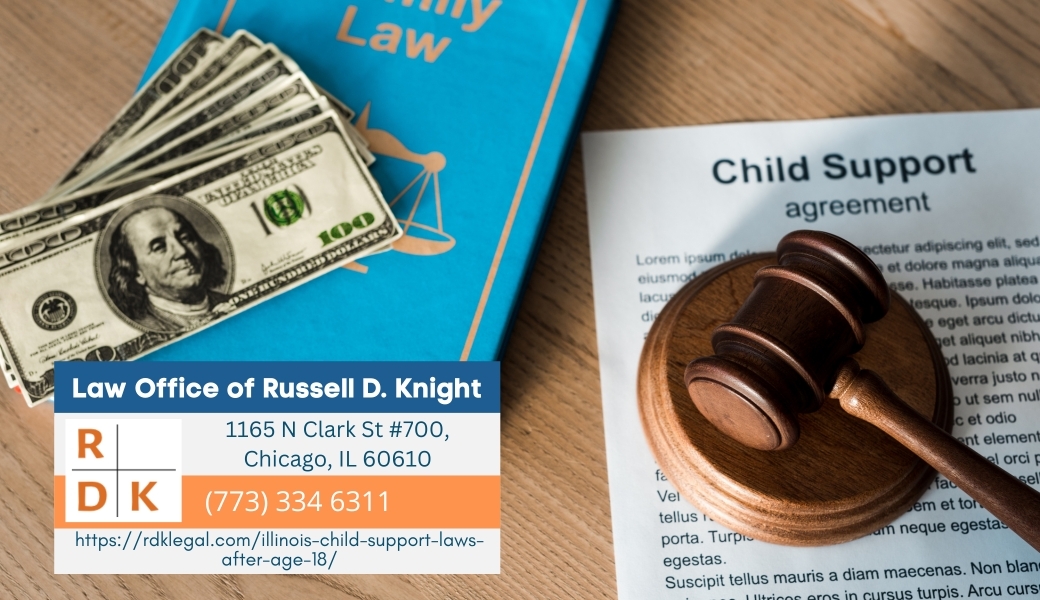Chicago divorce lawyer Russell D. Knight (https://rdklegal.com/illinois-child-support-laws-after-age-18/), of the Law Office of Russell D. Knight, clarifies Illinois child support laws regarding obligations for children over the age of 18 in the latest article. Child support obligations often spark questions among parents as children grow older, especially when they reach legal adulthood.
Child support in Illinois typically ends when a child turns 18, but the law includes important exceptions, particularly if the child is still in high school. Chicago divorce lawyer Russell D. Knight explains that under Illinois law, “The term ‘child’ shall include any child under age 18 and any child age 19 or younger who is still attending high school.” This means child support obligations continue until the child graduates high school or reaches the age of 19, whichever comes first. Divorce lawyers often face cases where understanding this distinction is crucial for both parents.
The Chicago divorce lawyer highlights that every child support order in Illinois must specify a termination date based on these rules. Without this, a child support obligation could inadvertently continue until one party files a motion to modify the order. Knight emphasizes the importance of this provision, noting that “an order for support shall include a date on which the current support obligation terminates. The termination date shall be no earlier than the date on which the child covered by the order will attain the age of 18.” Knight points out that this rule helps ensure clarity for both parents.
Beyond the standard age limits, child support can be extended in specific circumstances. In the article, Russell D. Knight discusses how Illinois law requires continued support for adult children who are disabled and not emancipated. Courts consider the needs of the disabled child alongside resources such as Social Security disability benefits. Knight shares that “the court may award sums of money for the support of a child who has attained majority when the child is mentally or physically disabled and not otherwise emancipated.” This provision underscores a parent’s ongoing obligation to care for adult children who cannot fully support themselves due to significant disabilities.
Another important aspect of Illinois child support laws discussed by Chicago divorce lawyer Russell D. Knight involves college expenses. Illinois law allows courts to require parents to contribute to their child’s higher education, including college tuition, vocational training, and related expenses. As Knight explains, “The authority under this Section to make provision for educational expenses extends not only to periods of college education or vocational or professional training after graduation from high school.” While child support may end when a child turns 18 or 19, obligations for educational expenses may extend far beyond these ages, depending on the child’s needs and educational goals.
Knight also addresses questions about emancipation and its impact on child support. Emancipation occurs when a child becomes financially independent, marries, or joins the military before turning 18. However, emancipation is not automatic and requires a formal petition in Illinois courts. “If the child does manage to become emancipated, an ongoing child support obligation in Illinois definitely ceases,” says Russell D. Knight. This process allows child support to be terminated appropriately when a child no longer requires parental financial support.
Finally, the article discusses how child support arrearages (past due support) are handled after a child turns 18. Russell D. Knight points out that arrearages remain enforceable even after a child reaches adulthood. Enforcement mechanisms, such as wage garnishment and license suspension, continue until the full amount owed is paid. This provision helps ensure that parents fulfill their financial obligations, regardless of the child’s age.
Parents managing these complex child support issues can benefit from understanding Illinois laws and seeking guidance from experienced attorneys such as Chicago divorce lawyer Russell D. Knight. Whether addressing standard termination dates, obligations for disabled children, or contributions to college expenses, the legal nuances of child support require careful consideration.
For parents unsure of their obligations or rights regarding child support after their child turns 18, consulting with a knowledgeable divorce lawyer can provide clarity and peace of mind. Russell D. Knight’s article serves as a valuable resource for anyone seeking a better understanding of Illinois child support laws.
About the Law Office of Russell D. Knight:
The Law Office of Russell D. Knight, based in Chicago, IL, focuses on divorce and family law matters, providing clear and straightforward legal guidance to clients managing complex family-related issues. Led by Chicago divorce lawyer Russell D. Knight, the firm is dedicated to helping clients achieve fair outcomes with a practical and compassionate approach.
Embeds:
Youtube Video: https://www.youtube.com/watch?v=sZGeq_Yh8-w
GMB: https://www.google.com/maps?cid=13056420905624162796
Email and website
Email: russell@rdklegal.com
Website: https://rdklegal.com/
Media Contact
Company Name: Law Office of Russell D. Knight
Contact Person: Russell D. Knight
Email: Send Email
Phone: (773) 334-6311
Address:1165 N Clark St #700
City: Chicago
State: Illinois 60610
Country: United States
Website: https://rdklegal.com/

